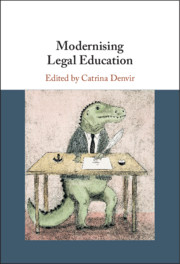Book contents
- Modernising Legal Education
- Modernising Legal Education
- Copyright page
- Contents
- Figures
- Tables
- About the Contributors
- Foreword
- Introduction
- 1 Do Lawyers Need to Learn to Code?
- 2 Experiential Legal Education
- 3 Skills Swap?
- 4 Scaling the Gap
- 5 Bringing ODR to the Legal Education Mainstream
- 6 Design Comes to the Law School
- 7 Developing ‘NextGen’ Lawyers through Project-Based Learning
- 8 Same As It Ever Was?
- 9 Ludic Legal Education from Cicero to Phoenix Wright
- 10 The Gamification of Written Problem Questions in Law
- 11 Virtually Teaching Ethics
- 12 Paths to Practice
- 13 ‘Complicitous and Contestatory’
- Afterword
- References
Afterword
Published online by Cambridge University Press: 30 December 2019
- Modernising Legal Education
- Modernising Legal Education
- Copyright page
- Contents
- Figures
- Tables
- About the Contributors
- Foreword
- Introduction
- 1 Do Lawyers Need to Learn to Code?
- 2 Experiential Legal Education
- 3 Skills Swap?
- 4 Scaling the Gap
- 5 Bringing ODR to the Legal Education Mainstream
- 6 Design Comes to the Law School
- 7 Developing ‘NextGen’ Lawyers through Project-Based Learning
- 8 Same As It Ever Was?
- 9 Ludic Legal Education from Cicero to Phoenix Wright
- 10 The Gamification of Written Problem Questions in Law
- 11 Virtually Teaching Ethics
- 12 Paths to Practice
- 13 ‘Complicitous and Contestatory’
- Afterword
- References
Summary
What will lead to meaningful change in legal education? And what should be the direction(s) of change? In the United States, as elsewhere, law schools are caught between critics who want them to be more responsive to the changing legal market and the needs of private employers, and critics who want them to do more to resist and shape the private market and promote the public good. These critiques are not wholly incompatible as a blueprint for curricular reform. Increasing students’ exposure to new skills and technologies, experiential training and projects, and collaboration with other professions, provides ‘opportunities for critical analysis and reflection’ as well as making students more employable.
Keywords
- Type
- Chapter
- Information
- Modernising Legal Education , pp. 258 - 262Publisher: Cambridge University PressPrint publication year: 2020
References
- 1
- Cited by

